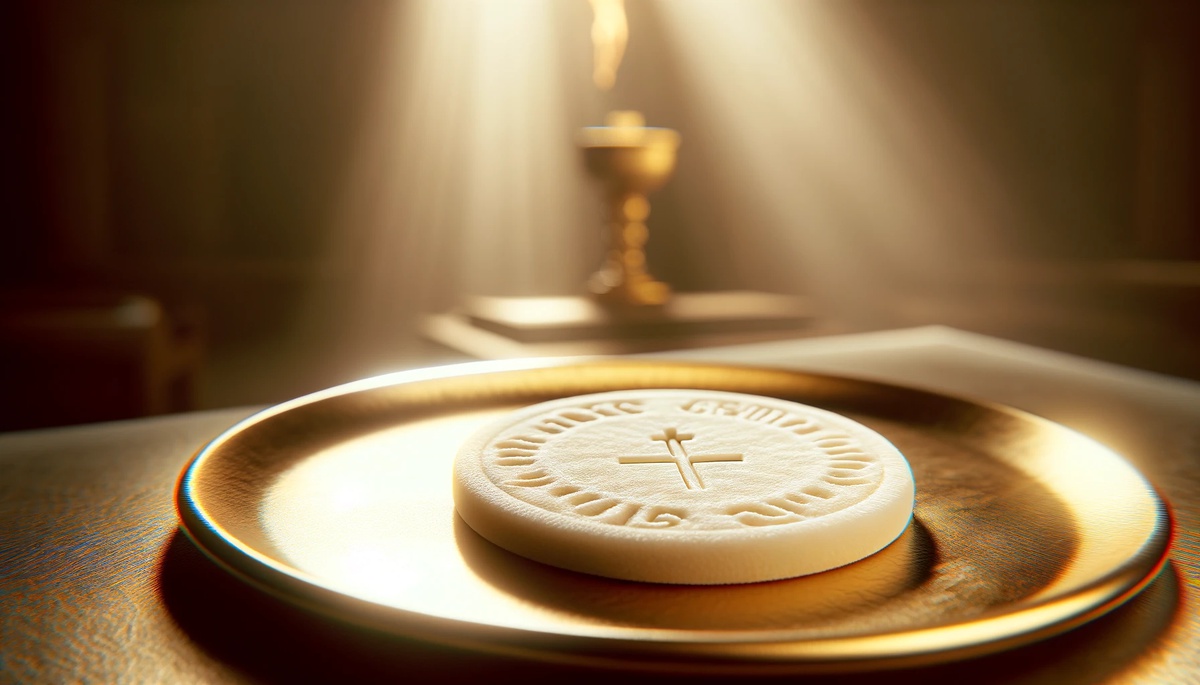Home>Theology and Spirituality>What Is The Purpose Of Communion?


Theology and Spirituality
What Is The Purpose Of Communion?
Published: February 19, 2024
Ericka Andersen, an editor at Christian.net, expertly merges digital strategy with content creation, focusing on faith and societal issues. Her communication skills enhance the platform's engaging narratives, fostering meaningful dialogue on belief's impact on society.
Discover the significance and purpose of communion in theology and spirituality. Explore the spiritual and symbolic meaning of this sacred practice.
(Many of the links in this article redirect to a specific reviewed product. Your purchase of these products through affiliate links helps to generate commission for Christian.net, at no extra cost. Learn more)
Table of Contents
Introduction
Communion, also known as the Eucharist or the Lord's Supper, holds a central place in the Christian faith. It is a sacred ritual that has been practiced for centuries, carrying deep spiritual significance for believers around the world. The act of communion is rooted in the teachings and actions of Jesus Christ, making it a fundamental aspect of Christian worship and theology.
Throughout the centuries, communion has evolved into various traditions and practices within different denominations, yet its core essence remains consistent. This ritual symbolizes the sacrificial death and resurrection of Jesus Christ, serving as a profound expression of faith and a means of spiritual nourishment for believers.
In the following sections, we will delve into the historical background, symbolism, and spiritual significance of communion, exploring its role as a means of remembrance, unity, and spiritual nourishment in the lives of Christians. By understanding the depth and purpose of communion, we can gain insight into its profound impact on the spiritual lives of believers and the broader Christian community.
Read more: What Is The Purpose Of The Day Of Atonement
Historical Background of Communion
The historical roots of communion can be traced back to the Last Supper, a significant event in the life of Jesus Christ. According to the New Testament, the Last Supper took place during the Passover feast, where Jesus shared a meal with his disciples in Jerusalem. It was during this gathering that Jesus instituted the practice of communion, imparting profound spiritual significance to the act of breaking bread and sharing wine.
The Gospel accounts of Matthew, Mark, and Luke, as well as the writings of the Apostle Paul in the New Testament, provide insights into the events of the Last Supper. Jesus took bread, blessed it, and gave it to his disciples, declaring, "Take, eat; this is my body." He then took the cup, gave thanks, and offered it to them, saying, "Drink from it, all of you; for this is my blood of the covenant, which is poured out for many for the forgiveness of sins."
This symbolic act of sharing bread and wine, representing the body and blood of Jesus, established the foundation of communion within Christian tradition. The disciples were instructed to partake in this ritual in remembrance of Jesus' sacrifice and the establishment of a new covenant through his impending crucifixion and resurrection.
Following the crucifixion and resurrection of Jesus, the early Christian community continued the practice of communion as a central element of their worship and fellowship. The Acts of the Apostles and the writings of early church leaders provide evidence of the early Christians gathering to share in the breaking of bread and the drinking of the cup, emphasizing the spiritual unity and remembrance of Christ's redemptive work.
Over time, various Christian traditions and denominations have developed distinct liturgical practices and theological interpretations of communion. These differences have given rise to diverse approaches to the frequency of communion, the understanding of the elements, and the theological significance attributed to the ritual. Despite these variations, the historical foundation of communion remains rooted in the Last Supper and the teachings of Jesus Christ, serving as a timeless symbol of spiritual nourishment and unity within the Christian faith.
In summary, the historical background of communion is deeply intertwined with the life and teachings of Jesus Christ, finding its origins in the Last Supper and continuing as a central practice within the Christian tradition. This historical foundation provides a rich and profound context for understanding the enduring significance of communion in the lives of believers across the centuries.
Symbolism of Communion
The act of communion is rich with symbolism, encapsulating profound spiritual truths and serving as a tangible expression of the Christian faith. At its core, communion symbolizes the sacrificial death and resurrection of Jesus Christ, embodying the central message of redemption and spiritual nourishment for believers.
The bread and wine, or in some traditions, the juice, used in communion carry deep symbolic significance. The bread represents the body of Christ, broken for the salvation of humanity. This act of breaking the bread mirrors the suffering and sacrifice of Jesus on the cross, emphasizing the profound love and selflessness inherent in his redemptive mission. Similarly, the wine symbolizes the blood of Christ, shed for the forgiveness of sins. This powerful symbol of Christ's blood signifies the atoning sacrifice that reconciles humanity with God, offering the promise of eternal life and spiritual renewal.
Furthermore, the act of partaking in communion fosters a sense of spiritual unity among believers. As individuals come together to share in the bread and the cup, they participate in a communal expression of faith and fellowship. This symbolizes the interconnectedness of the body of Christ, emphasizing the shared identity and purpose of the Christian community. The act of communion serves as a unifying force, transcending individual differences and uniting believers in their shared devotion to Christ and his redemptive work.
Moreover, the act of communion serves as a tangible means of encountering the presence of Christ. In partaking of the elements, believers experience a profound spiritual communion with Jesus, recognizing his ongoing presence in their lives. This symbolic act of partaking in the body and blood of Christ signifies a deep spiritual nourishment, as believers are reminded of their dependence on Christ for sustenance and spiritual sustenance.
In summary, the symbolism of communion encompasses the sacrificial nature of Christ's death, the unifying fellowship of believers, and the spiritual nourishment derived from encountering the presence of Christ. This rich symbolism infuses the act of communion with profound spiritual depth, serving as a tangible expression of the central tenets of the Christian faith.
Spiritual Significance of Communion
The spiritual significance of communion extends far beyond a mere symbolic ritual within the Christian faith. At its core, communion embodies profound spiritual truths and serves as a transformative experience for believers. Through the act of partaking in the bread and the cup, individuals engage in a sacred encounter that transcends the physical realm, fostering a deep spiritual connection with the person and redemptive work of Jesus Christ.
Communion serves as a poignant reminder of the sacrificial love and redemptive mission of Jesus Christ. As believers partake in the elements, they are invited to reflect on the profound act of selflessness demonstrated by Jesus through his sacrificial death on the cross. The bread, representing his broken body, and the wine, symbolizing his shed blood, encapsulate the essence of Christ's redemptive work, offering a tangible expression of God's love and grace. This act of remembrance instills a sense of gratitude and reverence, prompting believers to contemplate the depth of Christ's sacrifice and the transformative power of his redemptive work in their lives.
Furthermore, communion serves as a means of spiritual renewal and restoration for believers. As individuals partake in the elements, they are invited to examine their hearts and lives in light of Christ's redemptive work. The act of communion provides a sacred space for introspection, repentance, and spiritual realignment, allowing believers to experience the cleansing and renewing power of Christ's forgiveness and grace. This spiritual nourishment derived from communion fosters a deep sense of spiritual intimacy and restoration, equipping believers to walk in the fullness of their identity as redeemed children of God.
Moreover, communion serves as a profound expression of spiritual unity within the body of Christ. As believers come together to partake in the bread and the cup, they participate in a communal act of faith and fellowship, transcending individual differences and uniting in their shared devotion to Christ. This shared experience of communion underscores the interconnectedness of the Christian community, emphasizing the collective identity and purpose of the body of Christ. Through communion, believers are reminded of their shared inheritance as children of God, fostering a deep sense of spiritual unity and mutual support within the broader Christian family.
In essence, the spiritual significance of communion encompasses the themes of remembrance, renewal, and unity, offering believers a transformative encounter with the person and redemptive work of Jesus Christ. This sacred ritual serves as a profound expression of God's love and grace, inviting believers into a deeper spiritual communion with Christ and with one another.
Communion as a Means of Remembering
Communion serves as a powerful means of remembering the sacrificial death and redemptive work of Jesus Christ. The act of partaking in the bread and the cup is imbued with profound significance, inviting believers to engage in a sacred remembrance of Christ's selfless love and ultimate sacrifice on the cross.
Through the ritual of communion, believers are called to remember the pivotal events of Jesus' life, particularly his crucifixion and resurrection. The act of breaking bread and sharing the cup serves as a tangible expression of remembrance, prompting individuals to reflect on the profound act of love and grace demonstrated by Jesus. This act of remembrance is not merely a passive recollection of historical events; rather, it is a transformative engagement with the enduring significance of Christ's redemptive work in the lives of believers.
As individuals partake in the bread, symbolizing Christ's broken body, and the wine, symbolizing his shed blood, they are invited to enter into a profound remembrance of the atoning sacrifice that reconciles humanity with God. This act of remembrance fosters a deep sense of gratitude and reverence, as believers contemplate the depth of Christ's love and the immeasurable cost of their redemption. It serves as a poignant reminder of the unmerited grace and mercy extended to humanity through Christ's sacrificial death, prompting believers to respond with humility and thanksgiving.
Furthermore, communion as a means of remembering extends beyond a mere mental recollection of past events; it encompasses a spiritual encounter with the living presence of Christ. As believers engage in the act of remembrance through communion, they are invited into a sacred communion with Jesus, recognizing his ongoing presence and redemptive work in their lives. This transformative remembrance kindles a deep spiritual intimacy, as believers are drawn into a profound encounter with the person of Christ, experiencing his love, grace, and sustaining presence in a tangible and transformative manner.
In essence, communion serves as a powerful means of remembering the sacrificial love and redemptive work of Jesus Christ, inviting believers into a transformative engagement with the enduring significance of Christ's redemptive work. This act of remembrance fosters a deep sense of gratitude, reverence, and spiritual communion with the living presence of Christ, shaping the spiritual identity and journey of believers as they walk in the fullness of their redemption.
Read more: What Was The Purpose Of The Gospels
Communion as a Means of Unity
Communion serves as a profound means of fostering spiritual unity within the body of Christ. As believers partake in the bread and the cup, they engage in a communal expression of faith and fellowship, transcending individual differences and uniting in their shared devotion to Jesus Christ. This act of unity holds significant spiritual and relational implications, shaping the collective identity and purpose of the Christian community.
At its core, communion embodies the interconnectedness of the body of Christ, emphasizing the shared inheritance and spiritual bond among believers. The act of partaking in the elements symbolizes a collective participation in the redemptive work of Jesus Christ, underscoring the unifying force of God's love and grace within the Christian community. This shared experience of communion serves as a tangible expression of the spiritual oneness that believers share as members of the broader family of God.
Furthermore, communion as a means of unity transcends individual differences and denominational boundaries, emphasizing the fundamental unity of all believers in Christ. Regardless of diverse theological perspectives or cultural backgrounds, the act of communion unites believers in their common faith in Jesus Christ. This unity amidst diversity reflects the rich tapestry of the body of Christ, highlighting the beauty of spiritual interconnectedness and mutual support within the broader Christian family.
Moreover, communion fosters a deep sense of relational unity and mutual care among believers. As individuals come together to partake in the bread and the cup, they engage in a communal act of fellowship and spiritual communion. This shared experience of communion strengthens the bonds of love and mutual support within the Christian community, fostering a spirit of unity and solidarity in the journey of faith.
In essence, communion serves as a powerful means of nurturing spiritual unity within the body of Christ, emphasizing the interconnectedness, relational unity, and collective identity of believers. This act of unity transcends individual differences, denominational boundaries, and cultural diversity, underscoring the profound spiritual bond and shared devotion that unites the Christian community in their common faith in Jesus Christ.
Communion as a Means of Spiritual Nourishment
Communion serves as a profound means of spiritual nourishment for believers within the Christian faith. The act of partaking in the bread and the cup represents a sacred encounter with the person and redemptive work of Jesus Christ, offering believers a transformative experience that transcends the physical realm and nourishes the depths of their spiritual being.
At its core, communion embodies the concept of spiritual sustenance, providing believers with a tangible expression of their dependence on Christ for nourishment and sustenance. The bread, symbolizing the broken body of Christ, and the wine, symbolizing his shed blood, serve as potent symbols of spiritual nourishment, offering believers a profound encounter with the life-giving sustenance found in Christ alone. As individuals partake in the elements, they are reminded of their deep spiritual hunger and the transformative power of Christ's redemptive work in satisfying the longing of their souls.
Furthermore, communion as a means of spiritual nourishment fosters a deep sense of spiritual intimacy and communion with Jesus. As believers partake in the bread and the cup, they enter into a sacred encounter with the living presence of Christ, experiencing his sustaining grace and love in a tangible and transformative manner. This spiritual communion with Jesus transcends mere physical nourishment, offering believers a profound sense of spiritual renewal and restoration as they partake in the life-giving sustenance found in the person of Christ.
Moreover, communion serves as a source of spiritual strength and empowerment for believers in their journey of faith. The act of partaking in the elements provides a sacred space for believers to draw near to Christ, finding strength and sustenance in his presence. This spiritual nourishment equips believers to walk in the fullness of their identity as redeemed children of God, empowering them to live out their faith with courage, resilience, and unwavering devotion to Christ.
In essence, communion as a means of spiritual nourishment offers believers a transformative encounter with the life-giving sustenance found in the person and redemptive work of Jesus Christ. This sacred ritual serves as a tangible expression of believers' dependence on Christ for spiritual nourishment, fostering a deep sense of spiritual intimacy, strength, and empowerment as they partake in the life-giving sustenance found in communion with Christ.
Conclusion
In conclusion, the practice of communion holds profound significance within the Christian faith, encompassing rich historical roots, deep symbolism, and transformative spiritual significance. From its origins in the Last Supper to its enduring presence in the lives of believers today, communion serves as a sacred ritual that embodies the sacrificial love and redemptive work of Jesus Christ.
The historical background of communion, rooted in the Last Supper and the teachings of Jesus Christ, provides a timeless foundation for understanding the enduring significance of this sacred ritual. The symbolism of communion, encapsulating the sacrificial nature of Christ's death, the unifying fellowship of believers, and the spiritual nourishment derived from encountering the presence of Christ, infuses the act of communion with profound spiritual depth.
Furthermore, communion serves as a means of remembering the sacrificial love and redemptive work of Jesus Christ, inviting believers into a transformative engagement with the enduring significance of Christ's redemptive work. This act of remembrance fosters a deep sense of gratitude, reverence, and spiritual communion with the living presence of Christ, shaping the spiritual identity and journey of believers as they walk in the fullness of their redemption.
Moreover, communion serves as a powerful means of nurturing spiritual unity within the body of Christ, emphasizing the interconnectedness, relational unity, and collective identity of believers. This act of unity transcends individual differences, denominational boundaries, and cultural diversity, underscoring the profound spiritual bond and shared devotion that unites the Christian community in their common faith in Jesus Christ.
Lastly, communion serves as a profound means of spiritual nourishment, offering believers a transformative encounter with the life-giving sustenance found in the person and redemptive work of Jesus Christ. This sacred ritual serves as a tangible expression of believers' dependence on Christ for spiritual nourishment, fostering a deep sense of spiritual intimacy, strength, and empowerment as they partake in the life-giving sustenance found in communion with Christ.
In essence, communion stands as a sacred bridge between the historical foundation of the Christian faith and the lived experience of believers today. It embodies the timeless truths of Christ's sacrificial love, the unity of the Christian community, and the spiritual nourishment derived from encountering the living presence of Jesus. As believers partake in the bread and the cup, they are invited into a sacred communion with the person and redemptive work of Jesus Christ, shaping their spiritual journey and fostering a deep sense of unity, nourishment, and transformative encounter with the living Christ.














